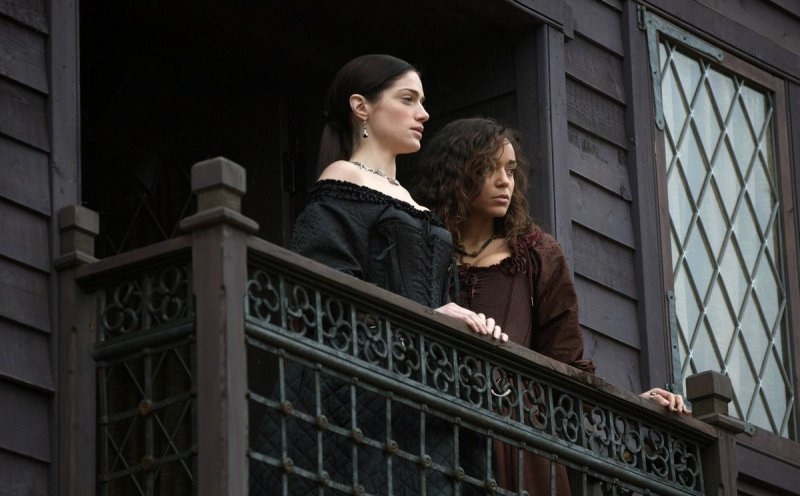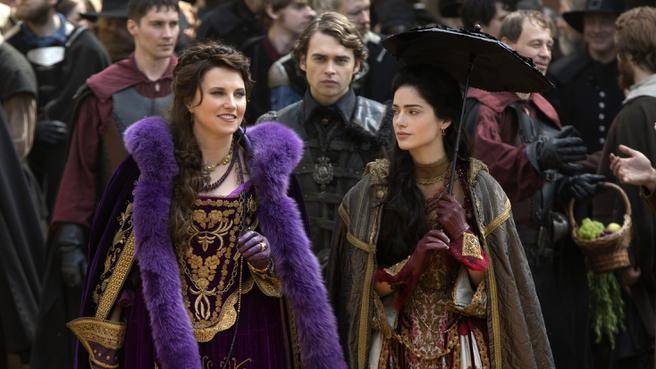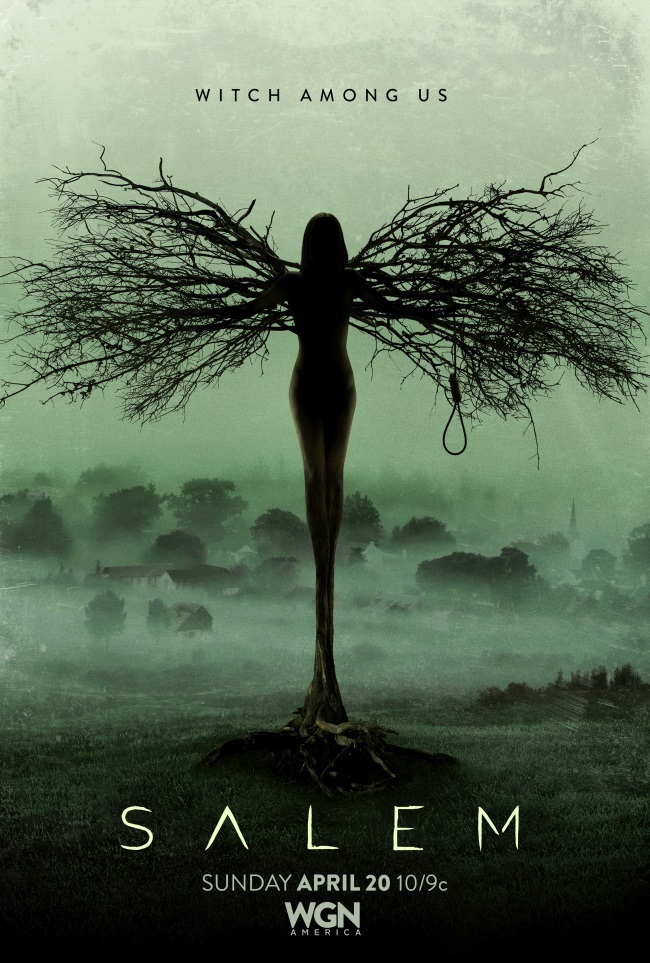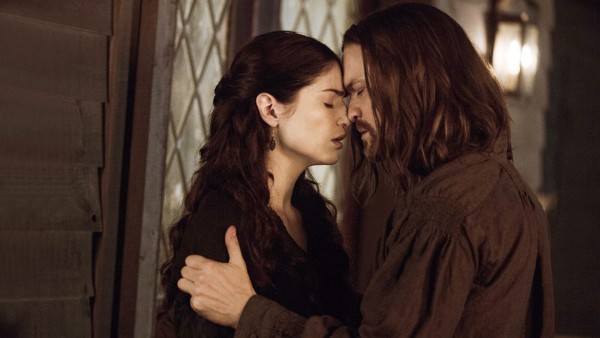Big Worlds On Small Screens: Rebecca Fisher Discusses “Salem”
~ by Rebecca Fisher
.
Introduction:
For a number of reasons, I can’t bring myself to actually recommend a show like Salem. I’ve always had a grim fascination with the Salem Witch Trials, a dark period of American history in which twenty people were executed for crimes of witchcraft between February 1692 and May 1693, in the small community of Salem, Massachusetts. Its legacy serves as a striking reminder of the dangers of mass hysteria and religious fanaticism, and is ripe material for a television drama.
But Salem decides to run with the theory that there were ACTUAL witches pulling the strings of the persecution – and furthermore uses the real names and identities of historical figures to populate its cast. Cotton Mather, Mercy Lewis, Bridget Bishop, John Hale, Giles Corey, Tituba – these were all real people who lived and died during this tumultuous period, reimagined here as anything from evil devil-worshippers to hypocritical witch-hunters.
I can handle a little dramatic license, but it takes some audacity to take a historical tragedy and posit that it was all secretly the work of the devil’s servants, working together to bring about the end of the world.
But putting all that aside, what is the show itself actually like?
Premise:
John Alden (Shane West) and Mary Sibley (Janet Montgomery) are two young lovers who are separated by war. While John marches off to join the army, Mary finds herself alone in Salem with a secret – she’s pregnant. To avoid stigmatization from the community she heads into the forest with her servant Tituba, where a strange ritual removes the child from her womb in exchange for wealth and power.
Seven years later John returns to Salem, only to find Mary married to the richest man in town (one conveniently confined to a wheelchair and unable to speak) and the community in the grip of a witch hunt. As he tries to quell the unrest, John finds himself in cahoots with his old childhood friend Cotton Mather, a preacher and witch-hunter who is convinced that the township is plagued with witches.
It’s not too much of a spoiler to say that Mary Sibley is the leader of the Salem coven, using her social position and magical powers to manipulate events toward outcomes that benefit her cause. And yet she herself is a pawn in a much larger game, beset on all sides not only by zealous witch-hunters but the ambitions and secrets of her fellow witches.
Story:
At first Salem seems like a show that wants to have its cake and eat it too. On the one hand, the show is aware that the religious fanaticism, misogyny and paranoia that drove the historical Salem Witch Hunts were very bad things. On the other, the gist of the story is that an evil coven is orchestrating the executions of innocent people throughout Salem so that they might accumulate enough bodies for their Grand Rite: a ritual that will allow the devil himself to return to earth.
The audience is left in the odd position of condemning the Witch Trials not because innocent people are dying for misguided beliefs, but because it’s all part of a ploy for real witches to bring about the end of the world. Who exactly do you root for: the evil witches or the hypocritical Puritans?
 Mary and Tituba survey events from their balcony
Mary and Tituba survey events from their balcony
Having said that, I have to admit that I’ve been rather addicted to this show since its premiere (it’s recently just wrapped up its second season). The plot is full of surprising twists, and the initial confusion as to what side you’re meant to be on is soon alleviated by the surprising complexity of the characters. Everyone has a range of motivations and some degree of sympathy – even the most evil of witches.
Characters:
Mary Sibley in particular emerges as a surprisingly complex character who is both powerful and powerless, sympathetic and detestable, full of agency and yet swept along in events she cannot control.
There’s also Anne Hale (Tamzin Merchant), a spirited young Puritan girl whose parents are keeping a terrible secret from her about her heritage and the innate power she possesses. In season two, we’re joined by Lucy Lawless as the Countess Marberg, an ancient sorceress who seeks out an alliance with Mary (whether she wants it or not!) in order to ensure the fulfilment of their long-term goals.
 Our own Lucy Lawless joins the cast
Our own Lucy Lawless joins the cast
Sensing a pattern here? The side-effect of a show that’s largely about witches is that most of the cast is inevitably made up of women. Even as they plot to destroy everyone, it’s still refreshing to have such a female-dominated cast.
Conclusion:
As I said at the beginning of this review, Salem is not a show I would heartily recommend to many people. Often it’s trashy and grotesque and hijacks a very serious piece of history in order to tell a rather silly horror story about the devil trying to take over the world.
And yet for all of that – I watch and enjoy it. So much melodrama, so many twists and turns, so many times when it crosses the line, doubles back, and then crosses it again. Perhaps it’s best if you don’t watch Salem. But if you do, brace yourself for a wild ride.
.
Next Time: X-Men Evolution
There have been dozens of iterations of the X-Men, from the comic books to the movie franchise to the Eighties cartoon. But my personal favourite was X-Men Evolution, which imagined most of the characters as high-school students whose most pressing concern was simply fitting in with their non-mutant peers.
Across its four seasons the storylines moved from the teenagers coping with the usual high-school pressures to fighting off powerful mutants who threatened the human race – with a great deal of character development thrown in the bargain.
.
About The Reviewer:
 Rebecca Fisher is a graduate of the University of Canterbury with a Masters degree in English Literature, mainly, she claims, because she was able to get away with writing her thesis on C.S. Lewis and Philip Pullman. She is a reviewer for FantasyLiterature.com, a large website that specializes in fantasy and science-fiction novels, as well as posting reviews to Amazon.com and her They’re All Fictional blog.
Rebecca Fisher is a graduate of the University of Canterbury with a Masters degree in English Literature, mainly, she claims, because she was able to get away with writing her thesis on C.S. Lewis and Philip Pullman. She is a reviewer for FantasyLiterature.com, a large website that specializes in fantasy and science-fiction novels, as well as posting reviews to Amazon.com and her They’re All Fictional blog.
To read Rebecca’s detailed introduction of both herself and the series, as well as preceding reviews, click on:
Big Worlds On Small Screens
Rebecca has recently won the Sir Julius Vogel Award 2015 for Best Fan Writer, for writing including Big Worlds On Small Screens.









